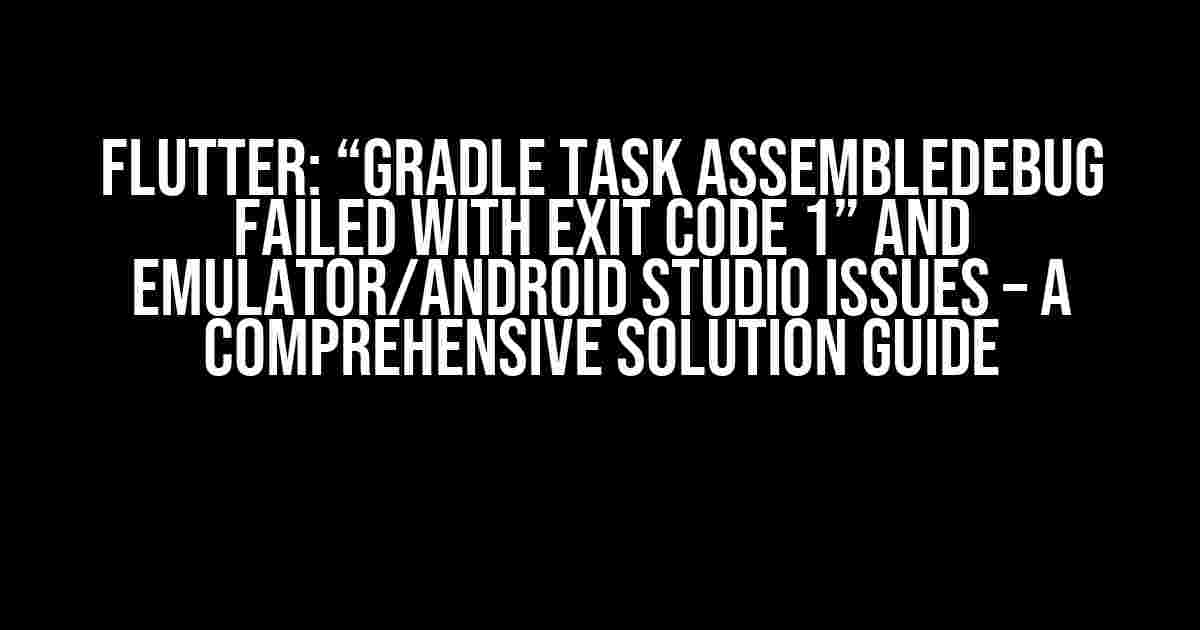Are you tired of seeing the frustrating error message “Gradle task assembleDebug failed with exit code 1” in your Flutter project? Are you struggling to get your emulator up and running in Android Studio? Fear not, dear developer! This article is here to guide you through the troubleshooting process and provide you with solutions to overcome these common issues.
- What’s Causing the “Gradle task assembleDebug failed with exit code 1” Error?
- Solution 1: Update Gradle Version
- Solution 2: Check Android SDK Version
- Solution 3: Clean and Invalidate Caches
- Solution 4: Check Project Structure and Configuration
- Solution 5: Check External Libraries and Plugins
- Emulator/Android Studio Issues
- Conclusion
- Frequently Asked Questions
What’s Causing the “Gradle task assembleDebug failed with exit code 1” Error?
The “Gradle task assembleDebug failed with exit code 1” error can occur due to various reasons, including:
- Gradle version compatibility issues
- Android SDK version conflicts
- Corrupted project files or cache
- Incorrect project structure or configuration
- External library or plugin issues
Solution 1: Update Gradle Version
Outdated Gradle versions can cause compatibility issues with the Android SDK and other plugins. To update Gradle:
- Navigate to the
android/build.gradlefile in your project - Update the Gradle version in the
buildscriptblock: - Sync your project with Gradle files by clicking on the “Sync” button in the top-right corner of Android Studio
buildscript {
ext.kotlin_version = '1.5.31'
repositories {
google()
jcenter()
}
dependencies {
classpath 'com.android.tools.build:gradle:4.2.0'
classpath 'org.jetbrains.kotlin:kotlin-gradle-plugin:1.5.31'
}
}
Solution 2: Check Android SDK Version
Ensure that your Android SDK version is compatible with the Gradle version and the project requirements:
- Open the SDK Manager in Android Studio by clicking on
Tools > SDK Manager - Check for any available updates and install the latest versions of the Android SDK
- Verify that the Android SDK version is compatible with the Gradle version in your project
Solution 3: Clean and Invalidate Caches
Sometimes, corrupted project files or cache can cause issues. To clean and invalidate caches:
- Invalidate caches and restart Android Studio by clicking on
File > Invalidate Caches / Restart - Delete the
.gradlefolder in your project directory - Delete the
buildfolder in your project directory - Rebuild your project by clicking on the “Build” button in the top toolbar
Solution 4: Check Project Structure and Configuration
Verify that your project structure and configuration are correct:
- Check that your project follows the standard Flutter project structure
- Verify that the
androidfolder is correctly configured in your project - Check that the
build.gradlefile is correctly configured for your project
Solution 5: Check External Libraries and Plugins
Verify that external libraries and plugins are up-to-date and compatible with your project:
- Check for any available updates for external libraries and plugins
- Verify that the versions of external libraries and plugins are compatible with your project
- Try removing or updating problematic libraries or plugins
Emulator/Android Studio Issues
In addition to the “Gradle task assembleDebug failed with exit code 1” error, you may encounter issues with your emulator or Android Studio. Here are some common solutions:
Emulator Issues
If your emulator is not launching or is not responding:
- Try closing and reopening the emulator
- Check that the emulator is correctly configured in Android Studio
- Try wiping the emulator data and restarting it
- Verify that the Android SDK version is compatible with the emulator version
Android Studio Issues
If Android Studio is not responding or is slow:
- Try restarting Android Studio
- Check for any available updates for Android Studio
- Verify that your system meets the minimum requirements for Android Studio
- Try disabling unnecessary plugins or features in Android Studio
Conclusion
In conclusion, the “Gradle task assembleDebug failed with exit code 1” error can be frustrating, but it’s often caused by simple issues that can be resolved with a few troubleshooting steps. By following the solutions outlined in this article, you should be able to overcome this error and get your Flutter project up and running smoothly. Remember to also check for emulator and Android Studio issues, as they can often be related to the Gradle error.
[table]
[/table]
By following these steps and solutions, you’ll be well on your way to resolving the “Gradle task assembleDebug failed with exit code 1” error and getting your Flutter project up and running smoothly.
Frequently Asked Questions
Q: What does the “Gradle task assembleDebug failed with exit code 1” error mean?
A: The “Gradle task assembleDebug failed with exit code 1” error means that the Gradle build process failed due to an unknown reason, often caused by compatibility issues or corrupted project files.
Q: How do I fix the “Gradle task assembleDebug failed with exit code 1” error?
A: Follow the solutions outlined in this article, including updating the Gradle version, checking the Android SDK version, cleaning and invalidating caches, checking the project structure and configuration, and checking external libraries and plugins.
Q: Why is my emulator not launching?
A: Try closing and reopening the emulator, checking that the emulator is correctly configured in Android Studio, wiping the emulator data and restarting it, and verifying that the Android SDK version is compatible with the emulator version.
Q: Why is Android Studio slow or not responding?
A: Try restarting Android Studio, checking for any available updates, verifying that your system meets the minimum requirements, and disabling unnecessary plugins or features.
By following these solutions and troubleshooting steps, you should be able to overcome the “Gradle task assembleDebug failed with exit code 1” error and get your Flutter project up and running smoothly.
Frequently Asked Question
If you’re facing issues with Flutter and Android Studio, you’re not alone! Here are some common questions and answers to help you troubleshoot and get back to coding in no time.
Q1: What does “Gradle task assembleDebug failed with exit code 1” mean, and how do I fix it?
This error usually occurs when there’s an issue with your Gradle configuration or dependencies. Try cleaning and rebuilding your project, and make sure your Gradle version is compatible with your Android Studio version. If that doesn’t work, delete the `.gradle` folder and rebuild your project from scratch.
Q2: Why won’t my emulator start, and I’m getting a “CPU architecture not supported” error?
This might be because your emulator is trying to run on an incompatible architecture. Try creating a new emulator with the correct architecture (e.g., ARM or x86) that matches your system’s architecture. You can also try updating your Android Studio and emulator to the latest versions.
Q3: How do I resolve “AAPT: error: attribute android:fontVariationSettings not found” error in Android Studio?
This error usually occurs when there’s a version mismatch between your Android SDK and Gradle plugin. Update your Android SDK and Gradle plugin to the latest versions, and make sure your `build.gradle` file is using the correct Android SDK version.
Q4: Why is my Flutter project not running on the emulator, and I’m getting a “Invalid SDK” error?
This might be because your Flutter project is not configured to use the correct Android SDK. Check that your `local.properties` file is pointing to the correct Android SDK directory, and make sure your Android SDK is installed and up-to-date.
Q5: How do I fix “Could not launch ‘/usr/local/Caskroom/android-platform-tools/latest/platform-tools/adb’: EOF” error in Android Studio?
This error usually occurs when there’s an issue with your Android Platform Tools installation. Try reinstalling the Android Platform Tools, and make sure the `adb` executable is in your system’s PATH. If you’re on a Mac, try reinstalling Android Studio and the Android SDK using Homebrew.


